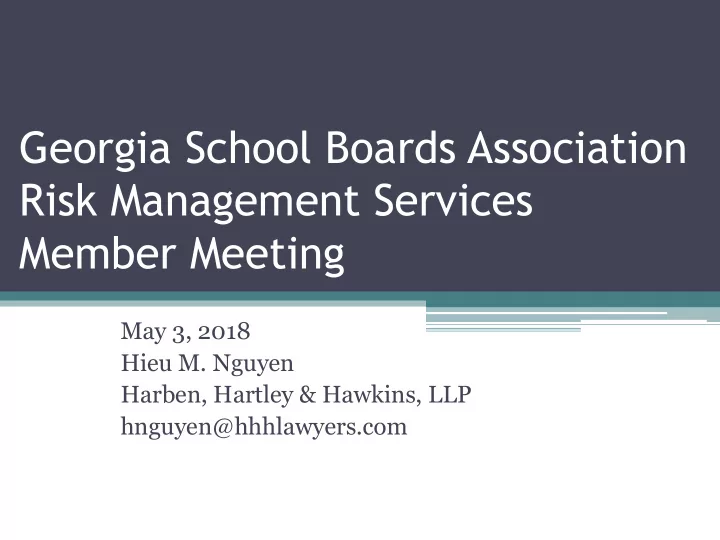

Georgia School Boards Association Risk Management Services Member Meeting May 3, 2018 Hieu M. Nguyen Harben, Hartley & Hawkins, LLP hnguyen@hhhlawyers.com
Exception to Weapons Statute Person who has been authorized in writing to possess a firearm in a school safety zone, at a school function or on a school bus if a local board authorizes such possession in a policy meeting the requirements of O.C.G.A. §16-11-130.1
O.C.G.A. §16-11-130.1 • Does not “require or otherwise mandate that any board of education or school administrator adopt or implement a practice or program for the approval of personnel to possess or carry weapons” • Nor does it “create any liability for adopting or declining to adopt” such a practice
O.C.G.A. §16-11-130.1 • Training of approved personnel prior to their authorization to carry weapons. • “The training shall at a minimum include training on judgment, pistol shooting, marksmanship, and a review of current laws relating to the use of force for the defense of self and others; provided, however, that the local board … may substitute for certain training requirements the personnel’s prior military or law enforcement service if the approved personnel has previously served as a certified law enforcement officer or has had military service which involved similar weapons training.”
O.C.G.A. §16-11-130.1 • An approved list of the types of weapons and ammunition and the quantity of weapons and ammunition authorized to be possessed or carried. • “The exclusion from approval of any personnel who has had employment or other history indicating any type of mental or emotional instability as determined by the local board of education.”
O.C.G.A. §16-11-130.1 • “A mandatory method of securing weapons which shall include at a minimum a requirement that the weapons, if permitted to be carried concealed by personnel, shall be carried on the person and not in a purse, briefcase, bag or similar other accessory which is not secured on the body… and, if maintained separate from the person, shall be maintained in a secured lock safe of similar lock box that cannot be easily accessed by students.”
O.C.G.A. §16-11-130.1 • Person approved to possess or carry weapons must be a license holder and the local board of education is responsible for conducting a criminal history background check annually to determine whether he or she remains qualified to fulfill these duties • “strictly on a voluntary basis”: employees cannot be terminated or otherwise retaliated against for refusing to do so.
O.C.G.A. §16-11-130.1 • The local board is responsible for any costs associated with training personnel to carry weapons and the implementation of the policy, but… • employees are not prohibited from paying all or part of the costs or… • “using any other funding mechanism available, including donations or grants from private persons or entities.”
O.C.G.A. §16-11-130.1 Documents and meetings pertaining to approving personnel to carry weapons are “considered employment and public safety security records and shall be exempt from disclosure” under the Open Records Act.
Other Considerations: • Coordinate with local law enforcement • Review and update School Safety Plans, involving law enforcement and emergency medical personnel and other relevant officials • Train staff and students, including the impact and consequences of hoaxes, social media “threats,” etc. • Potential increased liability exposure
11 Barnett v. Atlanta Independent School System Ga.SCt – January 28, 2018 “Even in the context of functions that are typically discretionary, a written (or unwritten) policy, a supervisor’s specific directive, or a statute may establish a ministerial duty — but only if the directives are so clear, definite, and certain as to merely require the execution of a specific, simple, absolute, and definite duty, task, or action in a specified situation without any exercise of discretion.”
Barnett , continued “As a court, the wisdom of an employee’s conclusion is not the question we evaluate; instead, we are tasked with discerning whether the employee had a range of options to choose from based on her own judgment. And in a situation where an official has that sort of discretion, the official is shielded from personal liability for the choices they make, even if they are poor ones, so long as the official does not act with actual malice or intent to cause injury.” 10
Barnett , continued “To be sure, officials are still subject to workplace policies, and can suffer a range of consequences for violating those policies. But the judgment that Georgia’s Constitution makes is that official immunity will protect those who make bad decisions in order to also protect those who make good ones, and to ensure that public officials can carry out their day-to-day service to the people of this State without fear of litigation.” 11
Barnett , footnote 2 “A duty is either discretionary or not and an official cannot alter that fact by performing it well, poorly, or not at all. Our Constitution itself demands that result.” “This is not to say that there could never be a policy on student supervision so definite as to render a school employee’s act ministerial.” 12
Recommend
More recommend